
This post contains spoilers for Shang-Chi and the Legend of the Ten Rings.
Shang-Chi is a tricky character for the Marvel Cinematic Universe to adapt, not least because his history in the comics is riddled with racist caricatures and stereotypes that are rightly shocking to today’s audiences. The MCU’s task in adding the character into the film universe is excising all of the damaging portrayals of Asian characters and identity and building something worthwhile from the material that was left.
Shang-Chi and the Legend of the Ten Rings, directed by Destin Daniel Cretton, is a breath of fresh air for the franchise and for its own character: The movie doesn’t gloss over the more problematic elements of the character’s past, or pretend they never happened, instead folding them into the narrative as a commentary on how the West has historically viewed Asian identity. To do this, it took bringing back a surprise character from the saga’s most underrated film.
When the press cycle for Iron Man 3 began in 2013, fans were rightly concerned that the big villain, according to most of the promotional material, was going to be a character called “the Mandarin,” canonically Iron Man’s arch-nemesis in the comics whose portrayal is (as you can tell from the name) a tad racist. A Chinese-English megalomaniac, he is obsessed with honor (yikes) and taking over the world, and is skilled in martial arts as well as the power that comes from 10 rings he wears on his fingers. The fact that Ben Kingsley would be playing the character was also heavily scrutinized, as Kingsley has no Chinese heritage. But director Shane Black knew exactly what he was doing, and if you’ve seen the movie, you know the big twist: The Mandarin was a character invented by the movie’s true villain, Aldrich Killian (Guy Pearce), and merely played by a struggling actor named Trevor Slattery (Kingsley), who was being paid to pretend to be a terrorist without knowing that his violent “threats” were actually being carried out by the real bad guys, giving Killian an excuse to deploy his weapons.
It was a daring move, and the movie’s big reveal works both as a biting commentary of the American military industrial complex as well as a metatextual evaluation of Ben Kingsley’s acting career (his portrayal of Mohandas Gandhi in 1982’s Gandhi, for which he won an Oscar, has been similarly scrutinized, as his father was of Gujarati Indian descent while his mother was English). It seemed as if Iron Man 3 found a way to include one of the comics’ most famous supervillains in the film series while also exposing and addressing that character’s problematic past in an elegant way—until, that is, the Marvel one-shot All Hail the King, which appeared on the home video release of Thor: The Dark World. In that short, an imprisoned Slattery learns that “the Mandarin” actually is a real guy, and it ends with Slattery being broken out of prison in order to meet him.
Which brings us to Shang-Chi, and the issue of the main character’s canonical past. In the comics, Shang-Chi is the son of a character named Fu Manchu, a breathtakingly racist portrayal of an Asian character and one that Marvel was straight up not going to include in the MCU at all—partially because of the aforementioned racism and partially because Marvel Studios doesn’t own the character. It stands to reason, sorta, that Shang-Chi would be the son of the Mandarin, the real Mandarin, if Marvel decided to actually put that character in the movies. As with Iron Man 3, Shang-Chi gets to have its cake and eat it, too: Shang-Chi is the son of a Chinese supervillain who wields a mystical power, but this character, whose name in the movie is Wenwu (played by Tony Leung), is connected to the Mandarin only in passing.
It’s established early on that Wenwu is a very old, very powerful figure, a warlord from ancient times who has adapted to the modern age and become the kingpin of a secretive organization known as the Ten Rings (named, ostensibly, for the 10 bracelets of power Wenwu wears on his arms). When Shang-Chi and his friends finally find him ensconced in his mountain fortress, he mentions that the outside world has called him many names—including, we can assume, “The Mandarin.” His pointed scoff in this moment indicates to all of us that he himself has never gone by that name.
A few scenes later, when Shang-Chi is escaping from the fortress, his group stumbles upon none other than Trevor Slattery holed up in the tunnels inside the mountain, having been brought there as entertainment for the mercenaries in training. Hapless Trevor joins their gang and ends up redeeming himself in the ensuing climactic battle, after driving most of the movie’s more lighthearted moments. It’s a fun full-circle inclusion of an otherwise minor character to tie the film in with the larger saga, as well as a sly rejection of the source material’s thorny past.








